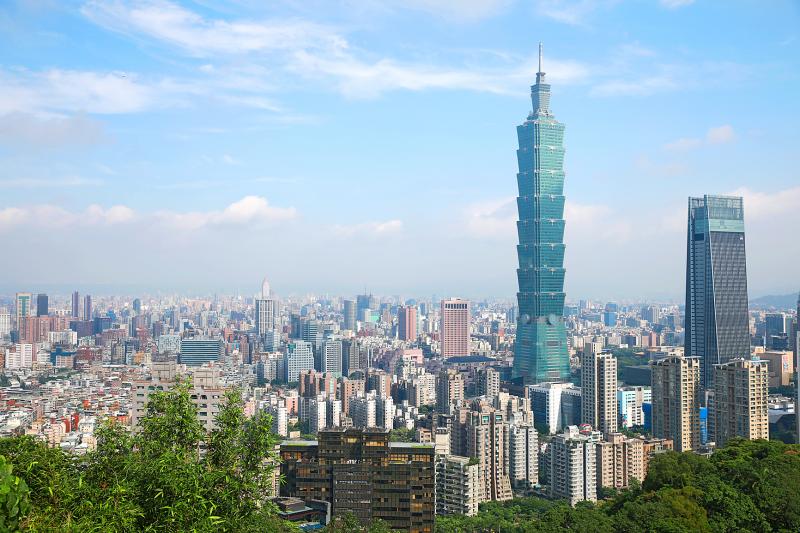About US$5.5 billion worth of commercial property changed hands in Taiwan last year, soaring 49 percent from a year earlier to a record high, fueled by strong performance in the industrial sector and a substantial hotel deal, Real Capital Analytics Inc said in a report yesterday.
“Taiwan made record in a positive way, thanks to the benefits of coming down hard on the COVID-19 pandemic and border controls early last year paid dividends for commercial property investors,” said David Green-Morgan, Real Capital managing director for the Asia-Pacific region.
It was the second time that Taiwan outperformed Singapore in commercial property deals, Green-Morgan said.

Photo: I-Hwa Cheng, Bloomberg
Industrial investments received a boost from continued realignment of electronics supply chains in the region, prompted by US-China trade tensions and accelerated by the COVID-19 pandemic, Real Capital said.
Sales of commercial property in the Asia-Pacific region picked up in the fourth quarter of last year, ending the pandemic-blighted year on a brighter note, it said.
Fourth-quarter sales reached US$44.7 billion, 10 percent lower than the same period in 2019 before the pandemic cast a shadow over the region, it added.
Last year’s sales in the region totaled US$141.2 billion across major income-producing property types, slumping 23 percent from a peak a year earlier, Real Capital said.
Several sectors and geographies surpassed previous levels in terms of dealmaking, despite the challenges presented by lockdowns, travel bans and the dimmed economic outlook, it said.
Taiwan, South Korea and India all hit record acquisition levels as a surge in demand for logistics facilities and data centers bolstered the industrial sector, it said.
Sales of development sites, principally in China, recovered 9 percent in the final quarter from a year earlier, but fell 7 percent for the whole of last year, with annual deal volume of US$628.5 billion, it added.
“The market has steadied and saw a rebound in the fourth quarter after a bleak and uncertain start to 2020,” Green-Morgan said.
The trend bodes well for market activity as Real Capital said it saw a number of deals across the region roll over into this year.
The industrial sector would forge ahead, thanks mainly to record trading of logistics assets and a spike in demand for data centers, it said.
Transactions in the logistics sector exceeded US$13 billion for the third consecutive year, as demand continues to outstrip supply, Real Capital said.
Data center deals more than tripled over the 2019 levels to almost US$5 billion in investment, it said.

Taiwan will prioritize the development of silicon photonics by taking advantage of its strength in the semiconductor industry to build another shield to protect the local economy, National Development Council (NDC) Minister Paul Liu (劉鏡清) said yesterday. Speaking at a meeting of the legislature’s Economics Committee, Liu said Taiwan already has the artificial intelligence (AI) industry as a shield, after the semiconductor industry, to safeguard the country, and is looking at new unique fields to build more economic shields. While Taiwan will further strengthen its existing shields, over the longer term, the country is determined to focus on such potential segments as

UNCERTAINTY: Innolux activated a stringent supply chain management mechanism, as it did during the COVID-19 pandemic, to ensure optimal inventory levels for customers Flat-panel display makers AUO Corp (友達) and Innolux Corp (群創) yesterday said that about 12 to 20 percent of their display business is at risk of potential US tariffs and that they would relocate production or shipment destinations to mitigate the levies’ effects. US tariffs would have a direct impact of US$200 million on AUO’s revenue, company chairman Paul Peng (彭雙浪) told reporters on the sidelines of the Touch Taiwan trade show in Taipei yesterday. That would make up about 12 percent of the company’s overall revenue. To cope with the tariff uncertainty, AUO plans to allocate its production to manufacturing facilities in

COLLABORATION: Given Taiwan’s key position in global supply chains, the US firm is discussing strategies with local partners and clients to deal with global uncertainties Advanced Micro Devices Inc (AMD) yesterday said it is meeting with local ecosystem partners, including Taiwan Semiconductor Manufacturing Co (TSMC, 台積電), to discuss strategies, including long-term manufacturing, to navigate uncertainties such as US tariffs, as Taiwan occupies an important position in global supply chains. AMD chief executive officer Lisa Su (蘇姿丰) told reporters that Taiwan is an important part of the chip designer’s ecosystem and she is discussing with partners and customers in Taiwan to forge strong collaborations on different areas during this critical period. AMD has just become the first artificial-intelligence (AI) server chip customer of TSMC to utilize its advanced

Chizuko Kimura has become the first female sushi chef in the world to win a Michelin star, fulfilling a promise she made to her dying husband to continue his legacy. The 54-year-old Japanese chef regained the Michelin star her late husband, Shunei Kimura, won three years ago for their Sushi Shunei restaurant in Paris. For Shunei Kimura, the star was a dream come true. However, the joy was short-lived. He died from cancer just three months later in June 2022. He was 65. The following year, the restaurant in the heart of Montmartre lost its star rating. Chizuko Kimura insisted that the new star is still down